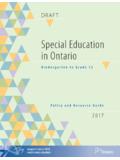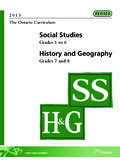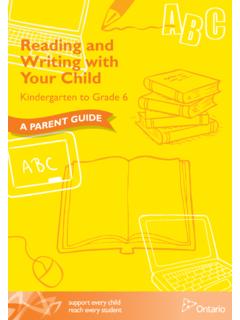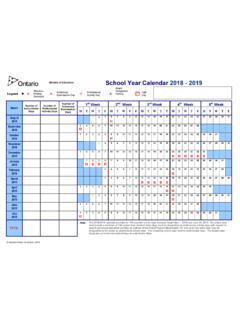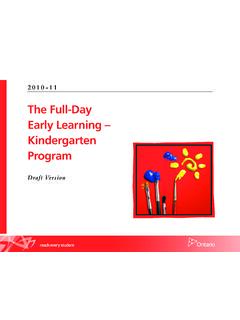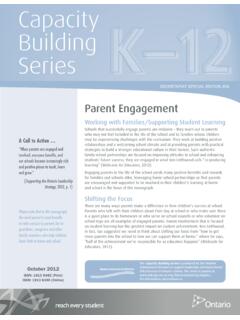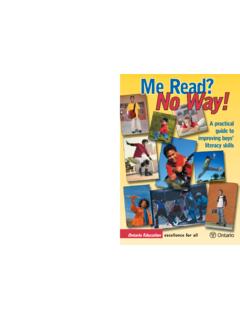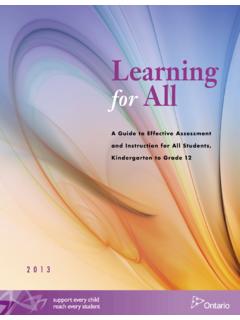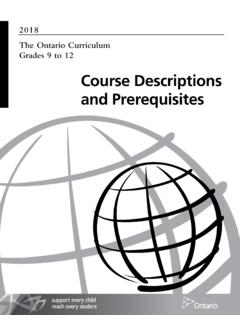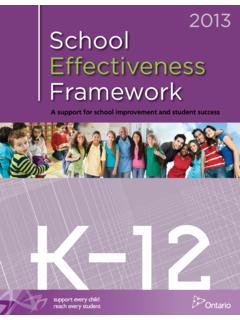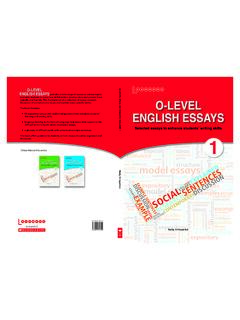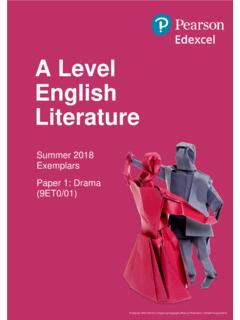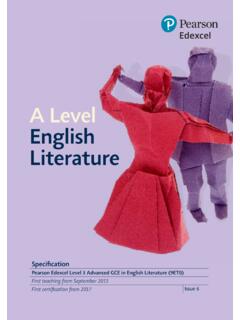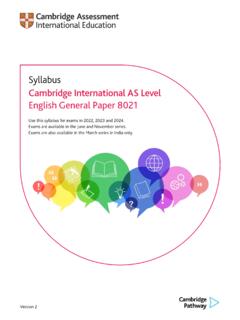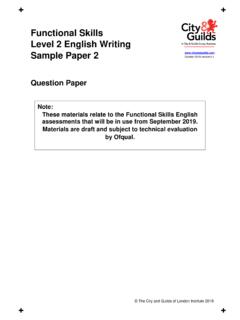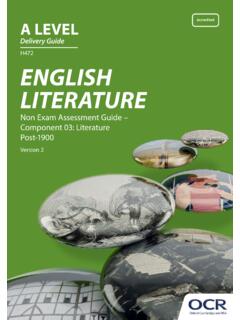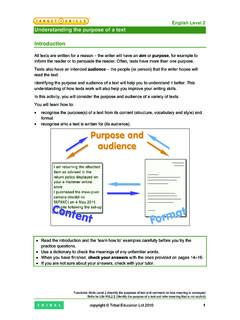Transcription of Ontario Curriculum, Grades 11 and 12 English
1 Ministry of EducationThe Ontario CurriculumGrades 11 and 12 English2000 ContentsIntroduction ..2 The Place of English in the Curriculum ..2 The Program in English ..4 Overview ..4 Teaching Approaches ..7 Curriculum Expectations ..7 Strands ..8 Compulsory Courses .. 12 English , Grade 11, University Preparation (ENG3U) .. 13 English , Grade 11, College Preparation (ENG3C) .. 22 English , Grade 11,Workplace Preparation (ENG3E) .. 31 English , Grade 12, University Preparation (ENG4U) .. 40 English , Grade 12, College Preparation (ENG4C) .. 49 English , Grade 12,Workplace Preparation (ENG4E) .. 58 Optional Courses .. 67 Canadian Literature, Grade 11, University/College Preparation (ETC3M) .. 68 Literacy Skills: Reading and Writing, Grade 11, Open (ELS3O).
2 72 Media Studies, Grade 11, Open (EMS3O) .. 78 Presentation and Speaking Skills, Grade 11, Open (EPS3O) .. 84 Studies in Literature, Grade 12, University Preparation (ETS4U) .. 89 The Writer s Craft, Grade 12, University Preparation (EWC4U) .. 93 Studies in Literature, Grade 12, College Preparation (ETS4C) .. 97 The Writer s Craft, Grade 12, College Preparation (EWC4C) .. 101 Communication in the World of Business and Technology, Grade 12, Open (EBT4O) .. 105 Some Considerations for Program Planning in English .. 110 The Achievement Chart for English .. 112 This publication is available on the Ministry of Education swebsite at Ontario Curriculum, Grades 11 and 12: English , 2000will be implemented in Ontario sec-ondary schools starting in September 2001 for students in Grade 11 and September 2002 forstudents in Grade 12.
3 This document replaces the following curriculum guidelines or thoseparts of guidelines that relate to the senior Grades : English , Intermediate and Senior Divisions ( Grades 7 12), 1987 English , Ontario Academic Courses, Senior Division, 1984 Business Studies: Business English , Senior Division, 1987 This document is designed for use in conjunction with The Ontario Curriculum, Grades 9 to 12:Program Planning and Assessment, 2000,which contains information relevant to all disciplinesrepresented in the curriculum. The planning and assessment document is available both inprint and on the ministry s website, at Place of English in the Curriculum To participate fully in the society and workplace of the twenty-first century, today s studentswill need to be able to use language skilfully, confidently, and flexibly.
4 The English curriculumoffers a challenging program of the highest quality, one that recognizes the central importanceof language and literature in learning and everyday life and prepares students for the literacydemands they will face as Canadians and members of the global community. Equally impor-tant, the English program encourages students to develop a lifelong love of reading is the basis for thinking, communicating, and learning. Students need literacy skillsto enable them to receive and comprehend ideas and information, to inquire further into areasof interest and study, to express themselves clearly, and to demonstrate their learning. Literacyskills are important for higher education and for eventual entry into the workplace. Studentswho are preparing for postsecondary education must develop literacy skills, as well as criticalthinking skills, in order to succeed in the challenging academic work of university and collegeprograms.
5 Students who are preparing for careers in business and industry also need these skillsin order to adapt to a workplace that is constantly changing. Whatever their postsecondarydestination, all students need to be able to think critically and creatively and to express them-selves clearly and effectively. Learning to communicate with clarity and precision, both orallyand in writing, will help students to thrive in their future endeavours in the world beyondthe is a fundamental element of identity and culture. As students read and reflect on arich variety of literature, informational texts, and media works, they deepen their understand-ing of themselves and the world around them. In their study of literary works by accom-plished writers and from many genres, historical periods, and cultures, students consider per-sonal and societal aspirations and explore possibilities.
6 Through the study of literature,students strengthen their ability to use language as an effective tool for thought, expression,and is also an essential tool for learning across the curriculum. When students considertopics, issues, or themes in various subject areas, they use and develop important literacy example, in science and technology, students must communicate effectively to recordobservations, describe investigations, and present their findings in oral and written must also learn to use many technical terms and types of specialized language. Facility inlanguage helps students to learn in all subject areas; at the same time, by using language for abroad range of purposes students increase their ability to communicate with precision and tounderstand how language in Ontario come from a wide variety of backgrounds.
7 This variety enriches the class-room experience in the same way that the study of authors from different cultures contributesto a greater appreciation of literature. There is no single correct way to teach or learn English ;it is assumed that the strategies and resources used will vary according to the object of thelearning and the needs of the matter from any course in English can be combined with subject matter from oneor more courses in other disciplines to create an interdisciplinary course. The policies andprocedures regarding the development of interdisciplinary courses are outlined in the inter-disciplinary studies curriculum policy learning is developmental and cumulative across the Grades : students develop flexi-bility and proficiency in their understanding and use of language over time.
8 The secondaryschool English curriculum for Grades 11 and 12 therefore builds on the expectations outlinedin The Ontario Curriculum, Grades 9 and 10: English , 1999, and provides students and teacherswith clearly stated, rigorous, and increasingly demanding expectations. In each grade in thesecondary curriculum, the expectations increase in scope and complexity. As students movethrough the Grades , they are required to use language with ever greater fluency, proficiency,and accuracy in a broadening range of situations. They take greater responsibility for their ownlearning and apply their language skills in more challenging and complex students in Grades 11 and 12 will continue practising skills covered in Grades 9 and10, the emphasis in the senior secondary Grades is on helping students consolidate the skillsand knowledge they need to prepare for their postsecondary destinations.
9 This emphasis willensure that students develop independence and master the range of complex skills they willneed for university and college programs and for the English program includes compulsorycourses, which are required for graduation, andoptionalcourses, which are elective credits offered only in Grades 11 and courses emphasize strong core competencies in reading, writing, use of language,and media awareness. As part of their program in Grades 11 and 12, students must take a com-pulsory course in English in each grade. They may choose their compulsory courses fromthree types of courses in Grades 11 and 12: university preparation, college preparation, andworkplace preparation. (See The Ontario Curriculum, Grades 9 to 12: Program Planning andAssessment, 2000for a description of the different types of secondary school courses.)
10 Optional courses provide students with opportunities to explore individual interests and todeepen and extend some of the knowledge and skills acquired in their compulsory coursesthrough more thematic and specialized study. Four types of optional courses are offered:university preparation, university/college preparation, college preparation, and open. Studentsmay choose to take one of the optional English courses to fulfil an additional compulsorycredit requirement for Courses in English , Grades 11 and 12 Grade Course Name Course Type Course Code Prerequisites11 English *UniversityENG3 UGrade 10 English , Academic11 English *CollegeENG3 CGrade 10 English , Applied11 English *WorkplaceENG3 EGrade 10 English , Applied12 EnglishUniversityENG4 UGrade 11 English , University12 EnglishCollegeENG4 CGrade 11 English , College12 EnglishWorkplaceENG4 EGrade 11 English , WorkplaceNote:Each of the courses listed above is worth one credit.
